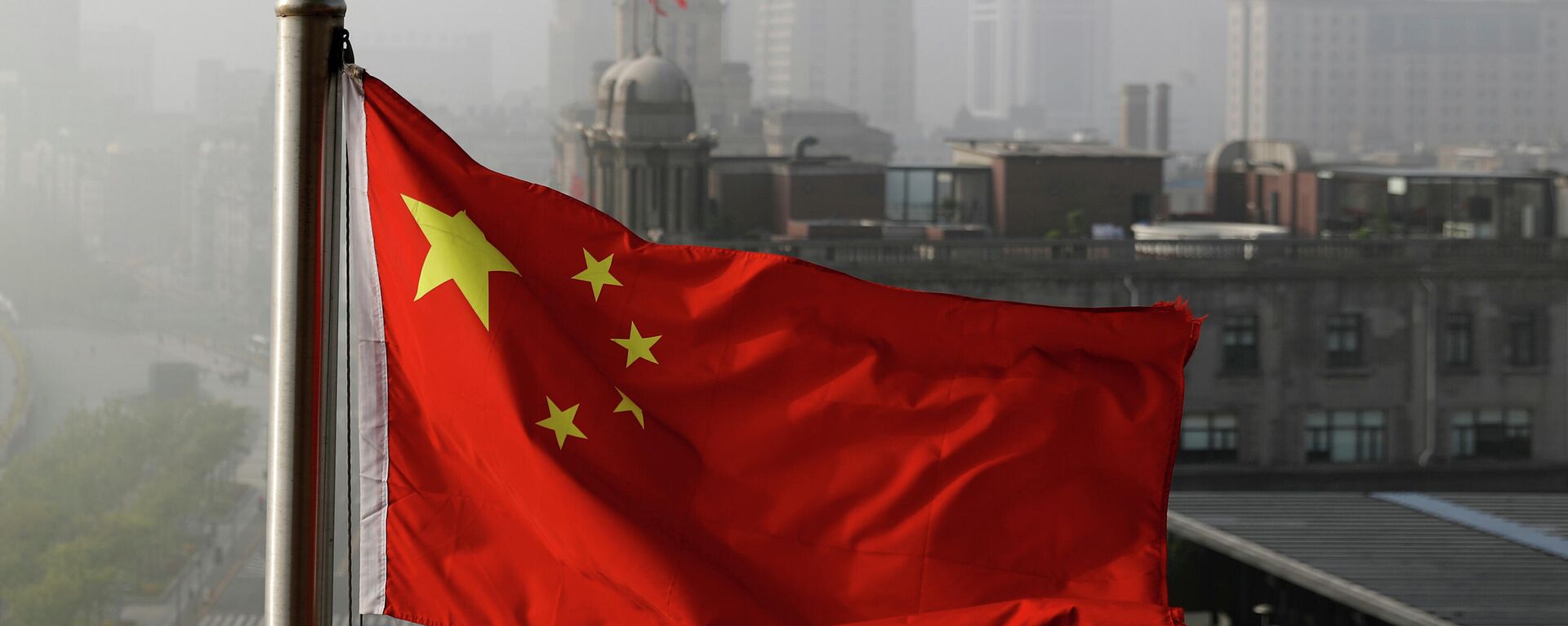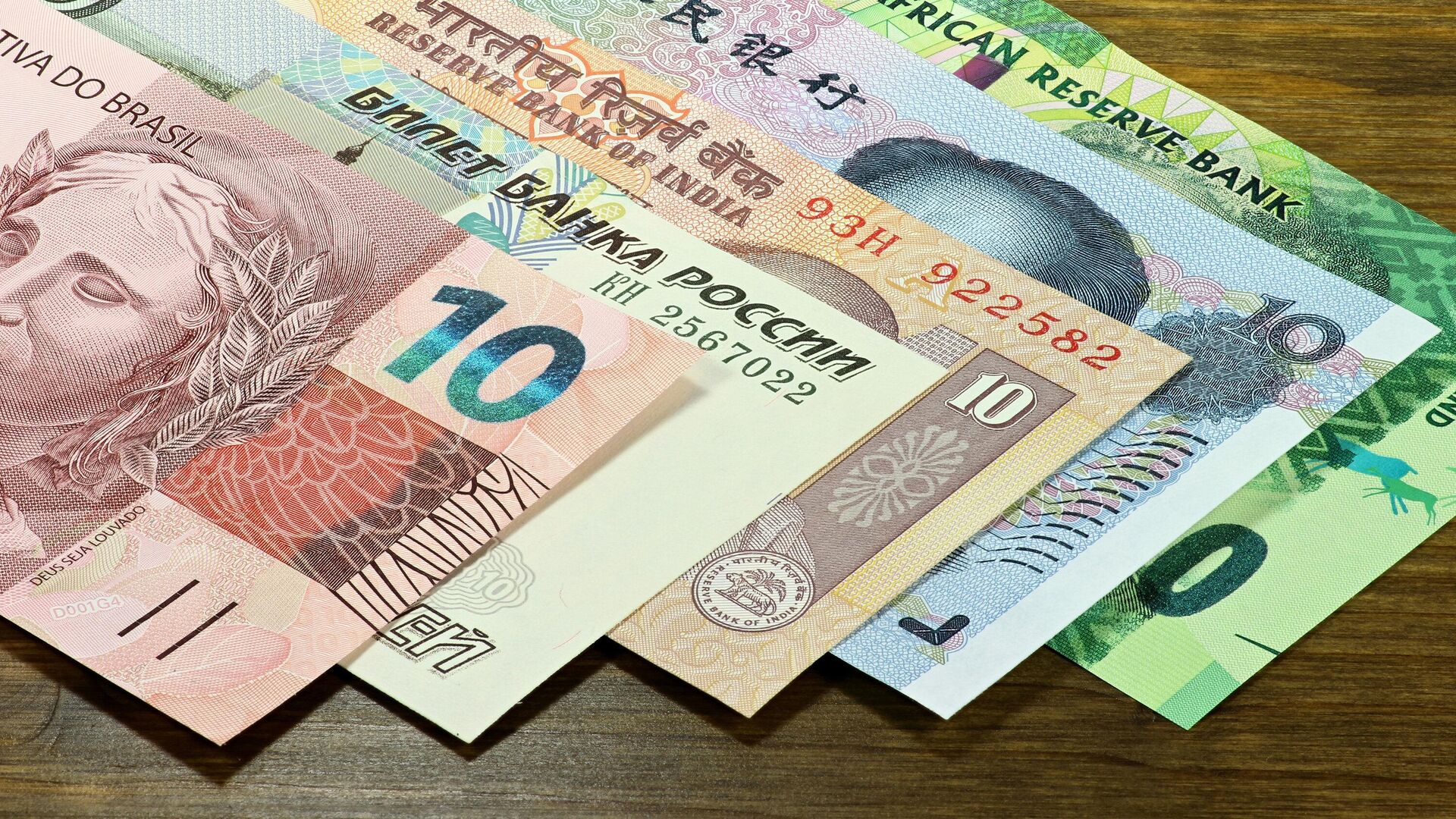https://sputnikglobe.com/20230831/pepe-escobar-does-brics-need-its-own-currency-1113013286.html
Pepe Escobar: Does BRICS Need Its Own Currency?
Pepe Escobar: Does BRICS Need Its Own Currency?
Sputnik International
The new era opened with the strategic tour de force inbuilt in the creation of BRICS 11 involves the make-or-break issue of setting up a new international economic/financial strategy.
2023-08-31T12:05+0000
2023-08-31T12:05+0000
2023-09-04T06:39+0000
analysis
brics
brics summit 2023
brics summit
brics new development bank (ndb)
dedollarisation
yuan
russia
china
https://cdn1.img.sputnikglobe.com/img/07e7/08/1f/1113017453_0:312:3001:2000_1920x0_80_0_0_f57f8ebdd48a712285877e55b58e0d48.jpg
Right at the heart of fervent discussions are the merits of designing a new BRICS currency.Brazilian economist Paulo Nogueira Batista Jr., a former IMF director who was deeply involved with BRICS from 2007 to 2015, has noted how a reserve currency discussion among the original five members was already too difficult. With 11, even more so.A currency has to be issued by a sovereign government. The indispensable Michael Hudson has cut to the chase to focus on what President Putin stressed in the summit in Johannesburg: what is needed is a means of settlement among Central Banks to keep in check the imbalances of trade and investment in their balance of payments.That implies no BRICS supra-national gold backed currency.Prof. Hudson has observed that, “nobody uses gold as a currency. You don’t go to the grocery store or you don’t buy stocks and bonds or even houses with gold. You’re not going to be able to do it with anything like a BRICS currency within the future.”So the possible “BRICS currency” on a - distant? – future will be “only a narrow currency that only governments can spend for each other, and it’s created on a computer. It’s not anything that you can hold in your pocket to spend.”You Can’t Pay for Your Coffee with ThisA senior advisor for the Bank of England, adds a few more elements: “A currency does not need to be issued by a single state, instead its issuance can be delegated by a group of states to a common institution, see the ECB [European Central Bank]. And while that currency would be unlikely to be used by people to buy a coffee (although who knows, given enough time), it could be used by corporations for invoicing in cross-border trade.”He projects a different future: “Imagine if 50-100 countries joined BRICS, some of them with pretty small, marginal currencies. They might appreciate being able to invoice and settle in a strong common currency rather than only having a choice between USD and, say, RMB. Not to mention the fact that if the Chinese want to keep some of their capital controls (good idea for now, I think), the RMB could not really fully replace the USD in such transactions. A BRICS currency would not be subject to such restrictions. This BRICS bank would buy up bonds of member countries according to some quota, and then issue a common currency against it, with all its gains and losses shared by member governments. That could create an arbitrarily large amount of liquidity (and firepower for BRICS) without requiring any debt to do so, in fact massively reducing debt while doing so. And of course I agree that this would need to be supplemented by a bancor-type arrangement to clear cross-country imbalances.”What’s certain for now is that at the heart of what’s coming next will be an enhanced role for the New Development Bank (NDB), the BRICS bank, headquartered in Shanghai and now presided by former Brazilian President Dilma Rousseff.Sergey Glazyev, the Minister of Macroeconomics at the Eurasia Economic Commission, an arm of the EAEU, has been very critical of the NDB, explaining how the bank statutes are linked to the US dollar; and that’s the reason why the bank is now semi-paralyzed, afraid of secondary US sanctions.That brings to the fore another issue stressed by the senior advisor: the BRICS-IMF connection. He observes, “it seems to me that the NDB is basically a World Bank, while I have heard very little about the Contingent Reserve Arrangement, which at one point was mentioned as a sort of embryonic BRICS-IMF.”What China Really WantsThis analysis , which caught Glazyev’s attention, delves on why the BRICS will not be able to become a competitor to reserve currencies – especially the US dollar and the euro - and launch full-fledged dedollarization right away.The gist of the argument is that only China “can claim to create a reserve currency”, as “the scale, depth of diversification and level of development of the Chinese economy are sufficient to compete with the US and the Eurozone.”The problem, according to the analysis, is that “reserve status cannot arise under conditions of restrictions on capital flows.”That brings us to the restricted convertible yuan, as there are “limits for foreign exchange that vary by region and investment destinations”; limits on “repatriation of capital through dividends and interest”; “industry capital withdrawal quotas for sensitive industries”; and “strict requirements for registration of foreign companies”, among other issues.So the analysis in fact boils down to raw capitalism:"There are no competitors to the dollar and euro in the international capital market and none are expected in the near future, because in order for the yuan to come out of the shadows China must liberalize financial policy and remove restrictions on capital control.”So “any breakdown of the existing world order in the currency market should be viewed exclusively through the focus of China.”But the thing is Beijing is not interested in having the yuan assuming the role of a world reserve currency. And neither were the BRICS, even before BRICS 11.The Chinese focus is increasing yuan trading and cash and settlement operations (roughly 4.5-5% of global turnover as of this month). In the next stage there will be more cross-border funding (as in yuan loans) and more attraction of international capital in yuan-denominated financial instruments. We’re not there yet.The analysis is correct to identify China’s priorities as “expanding the yuan's presence in the external market and resetting internal entropy through decentralization and international spread of the yuan money supply.”The analysis is also not off the mark when it concludes that the yuan is not a competitor to the US dollar or the euro: “They are in different dimensions, at different stages of development and with a different development trajectory.”So what’s bound to happen next is “more pronounced yuanization among neutral countries, where China will take subordinate and dependent countries into its orbit, expanding its influence.”We’re not Gonna Take it AnymoreMichael Hudson’s vision is way more sophisticated, and goes way beyond the internationalization of the yuan or the need for a BRICS currency. He touches the heart of the problem for the Global South/Global Majority/Global Globe:“The Global South countries have an economic catheter into their monetary bloodstream, draining their balance-of-payments surpluses to pay the post-colonial (or perhaps we should say neo-colonial) burden of dollarized ‘dependency arrears’ from being blocked from balancing their foreign trade and investment.”He adds, “if countries have to keep paying their export earnings and new borrowing (such as Argentina’s borrowing of yuan from China) to pay the IMF and other dollar holders (often their own domestic kleptocratic elite), then how can they accumulate yuan, rubles, rupees, rials and other Global South currencies? For this to occur they have to say, ‘Now that we have kicked out the French colonialists and U.S. NGOs, we have to annul the bills they are holding for making us pay for the warped investment and trade patterns that have been forced upon us since World War II.”It goes without saying imperial forces, even in their current disarray, will accept that over their dead bodies. Still, Prof. Hudson is relentless when denouncing how the IMF and the World Bank “pushed resource allocation away from domestic food production to export-crop production, and away from import substitution to import dependency – all capped by privatization sell-offs of basic infrastructure to foreigners to impose monopoly pricing and capital flight instead of providing basic services at subsidized prices to make their economies more competitive, as the U.S. and Europe were doing with their own economies.”That, as Prof. Hudson stresses, is where the political discussion should focus on. Call it a direct message to the BRICS 11. And that is way more relevant than speculating about a far and away BRICS currency.
https://sputnikglobe.com/20230818/what-is-the-global-south-and-how-can-it-help-topple-western-led-world-order-1112688739.html
https://sputnikglobe.com/20230830/whos-mark-lambert-and-how-could-he-influence-bidens-china-policy-1112997075.html
russia
china
Sputnik International
feedback@sputniknews.com
+74956456601
MIA „Rossiya Segodnya“
2023
Pepe Escobar
https://cdn1.img.sputnikglobe.com/img/101642/49/1016424943_868:0:3100:2232_100x100_80_0_0_a742038b05a1847ce42e71952e4994d5.jpg
Pepe Escobar
https://cdn1.img.sputnikglobe.com/img/101642/49/1016424943_868:0:3100:2232_100x100_80_0_0_a742038b05a1847ce42e71952e4994d5.jpg
News
en_EN
Sputnik International
feedback@sputniknews.com
+74956456601
MIA „Rossiya Segodnya“
Sputnik International
feedback@sputniknews.com
+74956456601
MIA „Rossiya Segodnya“
Pepe Escobar
https://cdn1.img.sputnikglobe.com/img/101642/49/1016424943_868:0:3100:2232_100x100_80_0_0_a742038b05a1847ce42e71952e4994d5.jpg
brics, brics 2023 summit, brics summit, de-dollarization, yuan, reserve currency, dollar currency
brics, brics 2023 summit, brics summit, de-dollarization, yuan, reserve currency, dollar currency
Pepe Escobar: Does BRICS Need Its Own Currency?
12:05 GMT 31.08.2023 (Updated: 06:39 GMT 04.09.2023) The new era opened with the strategic tour de force inbuilt in the creation of BRICS 11 involves the make-or-break issue of setting up a new international economic/financial strategy.
Right at the heart of fervent discussions are the merits of designing a new BRICS currency.
Brazilian economist Paulo Nogueira Batista Jr., a former IMF director who was deeply involved with BRICS from 2007 to 2015, has noted how a reserve currency discussion among the original five members was already too difficult. With 11, even more so.
A currency has to be issued by a sovereign government. The indispensable Michael Hudson has cut to the chase to focus on what President Putin stressed in the summit in Johannesburg: what is needed is a means of settlement among Central Banks
to keep in check the imbalances of trade and investment in their balance of payments.
That implies no BRICS supra-national gold backed currency.
Prof. Hudson
has observed that, “nobody uses gold as a currency. You don’t go to the grocery store or you don’t buy stocks and bonds or even houses with gold. You’re not going to be able to do it with anything like a BRICS currency within the future.”
So the possible “BRICS currency” on a - distant? – future will be “only a narrow currency that only governments can spend for each other, and it’s created on a computer. It’s not anything that you can hold in your pocket to spend.”
You Can’t Pay for Your Coffee with This
A senior advisor for the Bank of England, adds a few more elements: “A currency does not need to be issued by a single state, instead its issuance can be delegated by a group of states to a common institution, see the ECB [European Central Bank]. And while that currency would be unlikely to be used by people to buy a coffee (although who knows, given enough time), it could be used by corporations for invoicing in cross-border trade.”
He projects a different future: “Imagine if 50-100 countries joined BRICS, some of them with pretty small, marginal currencies. They might appreciate being able to invoice and settle in a strong common currency rather than only having a choice between USD and, say, RMB. Not to mention the fact that if the Chinese want to keep some of their capital controls (good idea for now, I think), the
RMB could not really fully replace the USD in such transactions. A BRICS currency would not be subject to such restrictions. This BRICS bank would buy up bonds of member countries according to some quota, and then issue a common currency against it, with all its gains and losses shared by member governments. That could create
an arbitrarily large amount of liquidity (and firepower for BRICS) without requiring any debt to do so, in fact massively reducing debt while doing so. And of course I agree that this would need to be supplemented by a bancor-type arrangement to clear cross-country imbalances.”
What’s certain for now is that at the heart of what’s coming next will be an enhanced role for the New Development Bank (NDB), the BRICS bank, headquartered in Shanghai and now presided by former Brazilian President Dilma Rousseff.
Sergey Glazyev, the Minister of Macroeconomics at the Eurasia Economic Commission, an arm of the EAEU, has been very critical of the NDB, explaining how the bank statutes are linked to the US dollar; and that’s the reason why the bank is now semi-paralyzed, afraid of secondary US sanctions.
That brings to the fore another issue stressed by the senior advisor: the BRICS-IMF connection. He observes, “it seems to me that the NDB is basically a World Bank, while I have heard very little about the Contingent Reserve Arrangement, which at one point was mentioned as a sort of embryonic BRICS-IMF.”
This analysis , which caught Glazyev’s attention, delves on why the BRICS will not be able to become a competitor to reserve currencies – especially the US dollar and the euro - and launch full-fledged dedollarization right away.
The gist of the argument is that only China “
can claim to create a reserve currency”, as “the scale, depth of diversification and level of development of the Chinese economy are sufficient to compete with the US and the Eurozone.”
The problem, according to the analysis, is that “reserve status cannot arise under conditions of restrictions on capital flows.”
That
brings us to the restricted convertible yuan, as there are “limits for foreign exchange that vary by region and investment destinations”; limits on “repatriation of capital through dividends and interest”; “industry capital withdrawal quotas for sensitive industries”; and “strict requirements for registration of foreign companies”, among other issues.
So the analysis in fact boils down to raw capitalism:
"There are no competitors to the dollar and euro in the international capital market and none are expected in the near future, because in order for the yuan to come out of the shadows China must liberalize financial policy and remove restrictions on capital control.”
So “any breakdown of the existing world order in the currency market should be viewed exclusively through the focus of China.”
But the thing is Beijing is not interested in having the yuan assuming the role of a world reserve currency. And neither were the BRICS, even before BRICS 11.
The Chinese focus is increasing yuan trading and cash and settlement operations (roughly 4.5-5% of global turnover as of this month).
In the next stage there will be more cross-border funding (as in yuan loans) and more attraction of international capital in yuan-denominated financial instruments. We’re not there yet.
The analysis is correct to identify China’s priorities as “
expanding the yuan's presence in the external market and resetting internal entropy through decentralization and international spread of the yuan money supply.”
The analysis is also not off the mark when it concludes that the yuan is not a competitor to the US dollar or the euro: “They are in different dimensions, at different stages of development and with a different development trajectory.”
So what’s bound to happen next is “more pronounced yuanization among neutral countries, where China will take subordinate and dependent countries into its orbit, expanding its influence.”
We’re not Gonna Take it Anymore
Michael Hudson’s vision is way more sophisticated, and goes way beyond the internationalization of the yuan or the need for a BRICS currency. He touches the heart of the problem for the Global South/Global Majority/Global Globe:
“The Global South countries have an economic catheter into their monetary bloodstream, draining their balance-of-payments surpluses to pay the post-colonial (or perhaps we should say neo-colonial) burden of dollarized ‘dependency arrears’ from being blocked from balancing their foreign trade and investment.”

30 August 2023, 18:05 GMT
He adds, “if countries have to keep paying their export earnings and new borrowing (such as Argentina’s borrowing of yuan from China) to pay the IMF and other dollar holders (often their own domestic kleptocratic elite), then how can they accumulate yuan, rubles, rupees, rials and other Global South currencies? For this to occur they have to say, ‘Now that we have kicked out the French colonialists and U.S. NGOs, we have to annul the bills they are holding for making us pay for the warped investment and trade patterns that have been forced upon us since World War II.”
It goes without saying imperial forces, even in their current disarray, will accept that over their dead bodies. Still, Prof. Hudson is relentless when denouncing how the IMF and the World Bank “pushed resource allocation away from domestic food production to export-crop production, and away from import substitution to import dependency – all capped by privatization sell-offs of basic infrastructure to foreigners to impose monopoly pricing and capital flight instead of providing basic services at subsidized prices to make their economies more competitive, as the U.S. and Europe were doing with their own economies.”
That, as Prof. Hudson stresses, is where the political discussion should focus on. Call it a direct message to the BRICS 11. And that is way
more relevant than speculating about a far and away BRICS currency.




